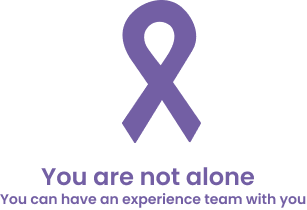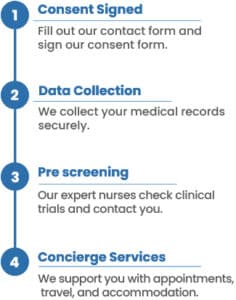News Massive Bio Has Onboarded Over 120,000 Cancer Patients To Find Their Clinical Trial
Discover Latest PIK3CA-Positive Cancer Treatments!
Are you a patient diagnosed with PIK3CA-Positive Cancer who is seeking innovative treatment options? Massive Bio can help you to access the latest therapies with no-cost clinical trial matching.
Compliant with

You can receive a guidebook with information about genomic testing by filling out the form.
PIK3CA-Positive Cancer Treatments!
Massive Bio’s advanced Artificial Intelligence system will match and suggest a range of potential PIK3CA-positive cancer treatments for your unique medical situation. Our Patient Relations Coordinators will evaluate your submission and reach out to you promptly to discuss your eligibility for our PIK3CA-positive cancer clinical trials.
We have an incredible opportunity for you to access a groundbreaking therapy that can revolutionize your journey with PIK3CA-Positive solid tumors. By signing up for our matching program, you’ll be connected to a personalized treatment option specifically tailored to your needs. Here’s how it works:
Diagnosis: If you have been diagnosed with PIK3CA-Positive cancer, you’re one step closer to finding a potential breakthrough in your treatment.
Innovative Therapy: Our cutting-edge therapy brings together the latest advancements in medical science and technology to target your PIK3CA-positive cancer with precision and effectiveness.
Personalized Match: We understand that every patient is unique, and that’s why we focus on matching you with a treatment plan that aligns with your specific requirements and medical history.
Expert Guidance: Throughout your journey, our experienced team of medical professionals will be by your side, providing guidance, support, and answering any questions you may have.
By signing up for our matching program, you’re taking an active role in exploring new possibilities and gaining access to an innovative therapy that can potentially transform your life. Don’t miss out on this opportunity to enhance your PIK3CA-positive cancer treatment. Join us today and let’s embark on this extraordinary path towards improved health together!
Please note: Have you undergone NGS/Biomarker testing? If your test result is PIK3CA+, then you’re just one step away from potentially life-changing treatment options. If you haven’t been tested yet, we strongly recommend that you do so and return to us. Your journey towards groundbreaking therapy begins with understanding your unique genetic markers.
We combine the power of technology with our dedicated team of medical providers to find you the best treatment options available.
Access the free matching toolA Clinical Trial May Be an Option for You
Massive Bio specializes in finding clinical trials of new treatments for PIK3CA-mutated cancers and cancers linked to other gene mutations. Patients who choose to enroll in clinical trials can receive cutting-edge treatment and high-quality care under the direction of doctors, nurses, and other healthcare professionals who are participating in research to discover new therapies for cancer. Patients can gain access to promising drugs and innovative treatments long before they’re made available to the public. If you’ve been diagnosed with cancer with a PIK3CA mutation, we’re here to help. If you aren’t sure if you have a cancer-related gene mutation, that’s okay. Additional testing can help you determine your exact diagnosis.
Talk to us. Our nurses and patient relations coordinators are here and happy to help you. You are not alone in this fight.
Call +1 844 627 7246


What is a HER2-Positive Cancer clinical trial?
Clinical trials test the latest scientific advancements in HER2-Positive cancer treatment. Patients who choose to enroll in trials can receive cutting-edge treatment and high-quality care under the direction of scientists, doctors, and researchers. HER2-Positive cancer patients can gain access to promising drugs and innovative treatments long before they're made available to the public.

What Are Clinical Trials?
Cancer is an unfortunate reality that touches most of us at some point in our lives. If you or a loved one has cancer, you may have heard or read that clinical trials could offer access to innovative new treatments. But what exactly is a clinical trial? In this video, Massive Bio co-founder Arturo Loaiza-Bonilla, MD, explains how clinical trials work, what to expect if you enroll in one, and why a clinical trial can be an important treatment option for many cancer patients.
We dream of the day when cancer disappears from our lives. Massive Bio is working tirelessly on achieving that goal.
-
Why should I trust Massive Bio?
Why should I trust Massive Bio?
Massive Bio has provided health to more than 120,000 cancer patients in 25 countries across three continents. It collaborates with over 80 global partners. In 2022, Massive Bio became part of the Precision Cancer Consortium (PCC), alongside major companies such as AstraZeneca, Bayer, Eli Lilly & Company, GSK, Johnson & Johnson/Janssen, Novartis and Roche.
-
What is the process?
What is the process?
To find the best clinical research studies for you, we need your medical history and consent. You can provide this consent by filling out the form on this page and the following pages. Once you’ve done that, our patient relations coordinator will contact you to discuss the details and provide further information for clinical research matching report.
-
Why do I have to provide my medical records to enroll in a clinical trial?
Why do I have to provide my medical records to enroll in a clinical trial?
To enroll in clinical trial, you must meet highly specific criteria that’s established by the researchers who are conducting the investigation. That includes detailed information about type of cancer, treatment history, response to treatment, and other data that is collected in medical records.
-
What should I do if I don’t have my medical records?
What should I do if I don’t have my medical records?
If you are being treated for cancer or any other disease, your doctor should have a complete record of your medical care, including specific information about what form of the disease you have and what treatments you have received. Your patient relations coordinator will contact you and inform you about the details.
-
What are the costs associated with Massive Bio’s services?
What are the costs associated with Massive Bio’s services?
Massive Bio provides its services to the patients and their doctors at no cost—you won’t have to pay anything to receive a clinical-research matching report. There are no hidden costs involved.
-
How does Massive Bio protect my personal information?
How does Massive Bio protect my personal information?
Massive Bio strictly adheres to all HIPAA guidelines and international regulations focused on maintaining your privacy. We take extra measures to secure your personal information, ensuring it is protected beyond the mandatory requirements.
-
Where can I find clinical research studies in my area?
Where can I find clinical research studies in my area?
Your doctor may know of a clinical research study being conducted in your area that’s recruiting participants and is right for you. However, Massive Bio uses its artificial intelligence-powered platform to match patients to clinical research studies of treatments that give you the best chance of a positive outcome and are being conducted in a geographical location that makes sense for you.
-
Can I continue seeing my doctor or oncologist while also taking services of Massive Bio?
Can I continue seeing my doctor or oncologist while also taking services of Massive Bio?
Yes, Massive Bio keeps your doctor up to date on your status throughout your participation.










Massive Bio has gone above and beyond to connect my family with the right care during Covid-19. I really appreciate their staff’s consistent and clear outreach during this process.
They have a really responsive and hard-working team. It’s a great way to explore clinical cancer trials and find alternative treatments.
I reached out to Massive Bio after learning of a recent breast cancer diagnosis of a family member. From free expert clinical trial matching to patient relations coordinator support, Massive Bio was able to provide me with the necessary resources and knowledge to provide my family member the support they needed during their cancer journey.
My father used the Virtual Tumor Board to get another treatment recommendation. The report was detailed, and the staff answered all our questions. I definitely recommend their services.
I have recommended this to colleagues for patients that could benefit from clinical trials or have exhausted their treatment options and need a second opinion. Massive Bio’s team puts great minds together to find better solutions for patients that might think they have none left.
Massive Bio’s team is amazing. They work tirelessly to help patients and providers. This company truly cares about the work they are doing and the care they are delivering.